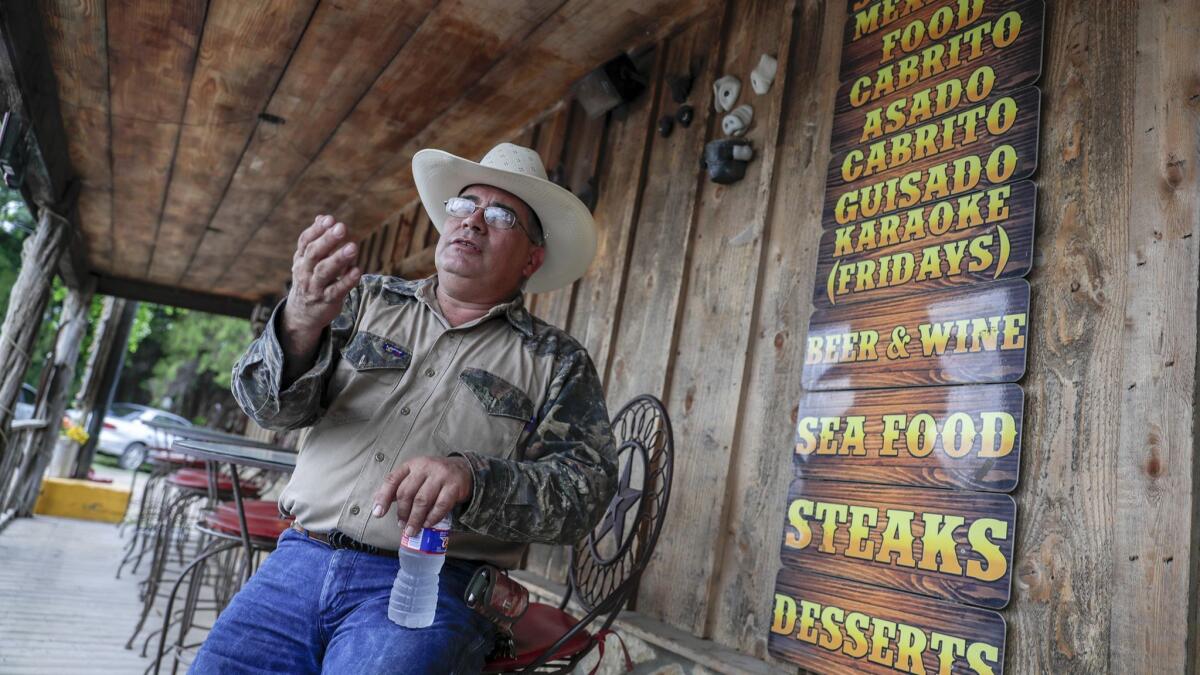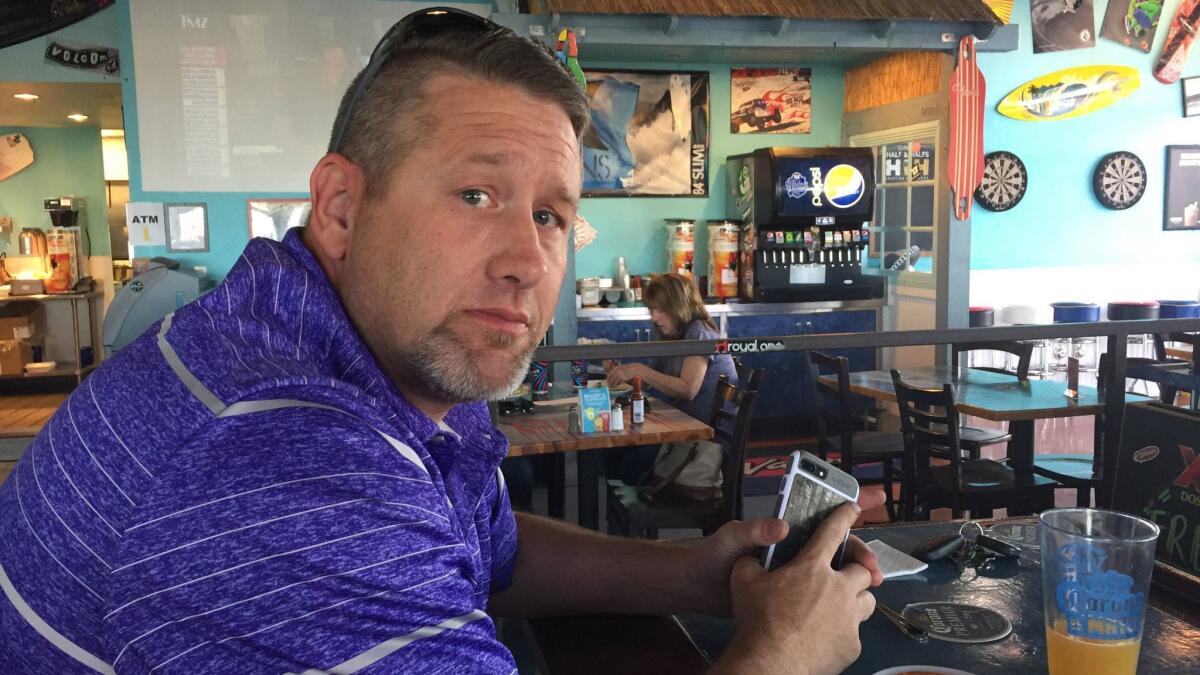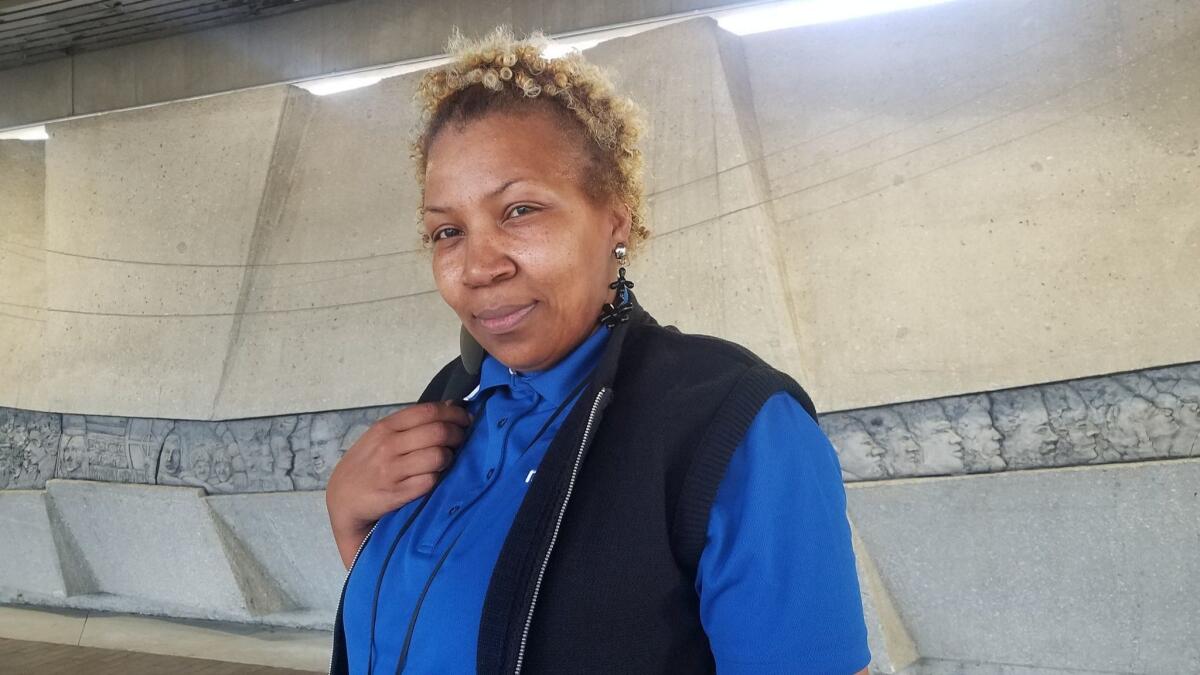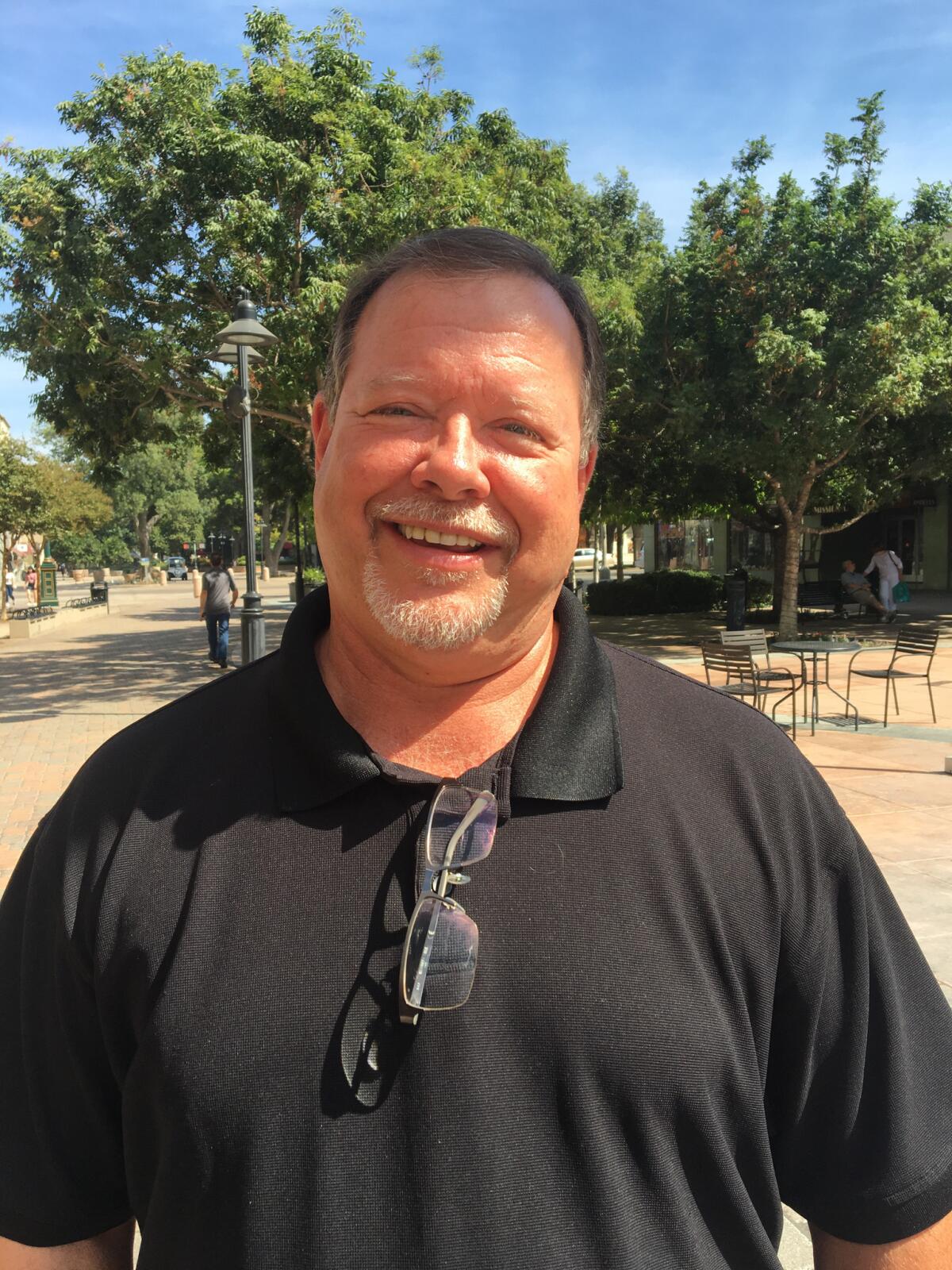A nation divided over Kavanaugh: ‘We have lost the ability to disagree without being disagreeable’

- Share via
Reporting from Atlanta — Even before they heard from his accuser, Americans were bitterly divided about the nomination of Judge Brett Kavanaugh to be a justice of the Supreme Court.
When it was over — after they had heard Christine Blasey Ford describe the night she says a 17-year-old Kavanaugh sexually assaulted her, after they had heard the high court nominee angrily deny her allegations — Americans appeared to have reached little consensus.
They did not agree on whom to believe. They did not agree on how the Senate should move forward. They did not agree on what the hearing said about the treatment of women, let alone the state of American democracy.
“A woman literally spoke her truth about sexual assault and it was taken with a shrug by some,” Deborah Austin, 58, a Democrat who works in healthcare, said Friday as she sat at Terminal 1 of Los Angeles International Airport, scrolling through news alerts on her iPhone. “Yet again, women continue to be disrespected by men.”
Austin said the Senate should not rush to advance Kavanaugh’s confirmation.
“They need to pause, give this some time,” she said as she waited with her husband, Ron, for a flight back to the Oakland area after a 25th wedding anniversary cruise to Mexico. “These are all men, these [Senate Judiciary Committee] Republicans, they need to ask — what if this is my daughter? My sister?”

As the committee voted Friday to advance Kavanaugh’s nomination to the full Senate, Americans were still processing Thursday’s testimony, which some hailed as powerful and wrenching and others dismissed as overly emotional and pointless.
“You look at her and she can’t remember nothing,” said Jeff Hatfield, 45, a real estate agent from Las Vegas. He yelled at the television as he watched the hearing, like it was a sporting event.
“She just remembered something happened,” said Hatfield, a former Marine who voted for Donald Trump in 2016. “When, where, how, what — all the stuff the legal system needs to prove guilt isn’t there. If I were him, I’d be angry too — being accused of something you know you didn’t do.”

Thousands of men and women gathered Friday in cities across the nation to protest Kavanaugh’s nomination to the Supreme Court. The mood was angry and energetic at a rally in Los Angeles, where more than 100 gathered on the steps of City Hall, chanting and wielding signs that said “Her truth is our truth” and “I believe her.” In Phoenix, protesters lined up outside the office of Republican Sen. Jeff Flake, a crucial vote in Kavanaugh’s confirmation process, holding up signs that read “History will Judge” and “I believe Ford.”
Views on the hearing were bitterly divided across the country, but they did not necessarily fall along neat gender or political lines. Though many women sided with Ford, saying they believed her, others questioned why she had taken so long to come forward.
“Why, all of a sudden, bring it up now, after all those years?” said Lysa Weddington, a 44-year-old bus driver from Jonesboro, Ga., who rolled her eyes and indignantly shook her head Friday as she walked to a public transit station in Atlanta’s West End. “It’s so long ago, why are they even discussing it? Please!”

Weddington, a Democrat, said that when she was 13, a friend of her dad’s made sexual advances on her when she went to his home to borrow some sugar. The first thing she did, she said, was tell her mother, who went straight to the man with stern words.
“If she was devastated about it then, she should have talked about it then,” said Weddington, who watched part of the hearing in bed late Thursday after she got home from work.
“The #MeToo movement is a bunch of garbage to me,” she said. “It’s just crazy.... A lot of people did stuff to me — lied to me, stole from me, hurt me — but it’s water under the bridge.”
For many women who tuned in to the hearing, it was emotionally exhausting.
“I’ve had my own experiences with assault; I think a lot of us have,” Meg Ochs, 23, a Los Angeles sound engineer, said Friday afternoon as she took her mom, visiting from Indiana, down Hollywood Boulevard.
Ochs said she cried through Ford’s testimony but was able to watch only a portion of Kavanaugh’s time on air. It made her feel sick.
“Just watching him sit there and be all smug was terrible. It was just a reminder that a lot of bad things happen to good people.”
Some men were equally quick to identify with Kavanaugh.

David Bride, 59, an electrical engineer in Riverside, said he could just tell by looking at Kavanaugh that he’s an honest man who, like him, has conservative values. And he thinks Ford is lying.
“That’s the hot ticket right now,” Bride said. “All of these women are bringing up some type of sexual harassment that’s happened in the past. This guy is guilty before he has a chance to be proven innocent, and that’s not how our system should work.”
In Las Vegas, Jennifer Kleven watched Ford’s testimony at home but ended up turning it off. It was too painful. And she couldn’t watch Kavanaugh at all.
“I literally thought, ‘Will women ever be safe?’” she asked. “Is this what America is? This is why women don’t come forward.”
The 33-year-old said she was depressed by the road the country has gone down since Trump was elected. She and her husband have asked themselves if they even want to bring kids into a country so bitterly divided.
“It feels like the changes we need to make are so big,” Kleven said. “But the changes have to start with equality.”
Though some had firm opinions, many who tuned in grappled with who was telling the truth.
“I don’t know what happened,” said Andrew Kayes, a 45-year-old radiologist in Maui, Hawaii. “I think something happened to Dr. Ford. She was obviously distraught. But I don’t think I’m ready to commit that Judge Kavanaugh did it. I am ready to give the presumption of innocence.”
An independent who voted for Trump and is against abortion, Kayes said he supported the president in 2016 “because I wanted to get a culture of life on the court.” He said the president’s Supreme Court picks, Judge Neil Gorsuch and Kavanaugh, delivered on his campaign promises.
“The poor man has been through a long process,” Kayes said of Kavanaugh. He said he was satisfied with the FBI background check on the judge that happened before sexual assault allegations against him went public. At the same time, he said, “I don’t think it’s unreasonable if he is confirmed for there to be further investigation.”
Kayes said the passionate, often angry debates on different sides of the confirmation process made him worry for the political culture in which his three elementary-school-aged children will grow up.
“We don’t have to agree with one another on anything to be kind to each other, but I feel like that has become a lost art,” he said. “We have lost the ability to disagree without being disagreeable.”
At the Rancho Cafe in Roma, Texas, the crowd was divided about who to believe. Some thought Ford was persuasive. Others from the largely Democratic, blue-collar border community thought she was strategically deploying big words and her credentials as a research psychologist.
Ismael Guerra, 56, a Democrat, cattle rancher and retired federal worker who watched part of the hearing at home with his wife and part at the Tex-Mex restaurant his family owns, said he leaned toward believing Ford. Still, he wasn’t convinced.
“Things like that shouldn’t happen, if it did,” he said as he stood outside the cafe Friday.
While Guerra praised Ford for coming forward and sending a message of “Don’t stay silent” to young girls, he saw the hearing as a political battle more than a quest for the truth.
“It’s really not about the victim, it’s about who plays a better ball game,” he said, and Kavanaugh “had a little stronger case than her.”
Many women, in turn, said the hearing revealed two sets of rules for how men and women were judged.
For Kate Rutz, a 47-year-old airline employee from Grand Rapids, Mich., the hearing was most notable for the performance of the two protagonists and how, afterward, they were perceived. The praise Kavanaugh received from the president and others for his tearful, flush-faced performance reflected to Rutz the double standard used in judging men and women.
“If she would have acted the same way Kavanaugh did answering questions, she would have been looked at as a brassy, you know, b-word,” Rutz said as she headed from Chicago’s Midway International Airport for a birthday weekend in Portland. “I don’t know that everyone would have felt that way, but people [who were] on the fence and weren’t too sure would say, ‘Oh, she’s pushy. It’s not a woman’s place to act that way in public.’”
Not everyone was captivated by the raw emotion of Thursday’s drama, or even much cared.
In Fountain Valley, Calif., homemaker Chinh Nguyen, a 46-year-old mother of two, said she was shocked by the “excessive” television coverage of the nominee over the last two weeks and especially over the last 24 hours.
“Why is everyone still talking about this?” she said as she sipped hot matcha green tea at a Starbucks in the Orange County community. “CNN is a big channel. Why don’t they and the others focus on something else? This case has just become noise. This is politics — not useful.”
A registered Republican, Nguyen believed Kavanaugh was honest in his testimony. Even if the incident happened as Ford described, she said, it was in high school and Kavanuagh deserved a second chance. She was skeptical of Ford’s motives, suggesting she came to testify “with a purpose.”
“This is the Democrats trying to eliminate the seat,” she said Friday. “Did they interview any witness? How can you trust the memory after so many years?”
Watching the drama unfold, many women said they felt powerless.
“We can’t do a thing about it aside from pontificating in our living rooms,” said Kanchana Krishnan, 56, a meditation teacher and Democrat from Coral Springs, Fla., who spent most of Thursday watching the hearings streamed from her phone and on PBS.
On Friday, she called the office of Sen. Marco Rubio to leave a message urging him to vote against the judge. Rubio said Friday that he supports the nomination.
“Women had never had a voice, that continues until this date,” said Krishnan, who said the #MeToo movement inspired her to recently tell her adult children of her sexual assault when she was 9. “Nothing we say will make a difference.”
Krishnan, who grew up in India and moved to South Florida in 1999, said the hearings have also changed her view of the United States.
“America was moral authority. Not anymore,” she said. “This is history. If they elect Kavanaugh, it will cause a revolution.”
Jarvie reported from Atlanta, Do from Fountain Valley and Lee from Los Angeles. Also contributing to this report were Times staff writers Jaweed Kaleem, Dakota Smith and Jaclyn Cosgrove in Los Angeles, Mark Barabak in Chicago, David Montero in Las Vegas, Molly Hennessy-Fiske in Roma, Texas, and Laura Newberry in Riverside.
More to Read
Sign up for Essential California
The most important California stories and recommendations in your inbox every morning.
You may occasionally receive promotional content from the Los Angeles Times.













